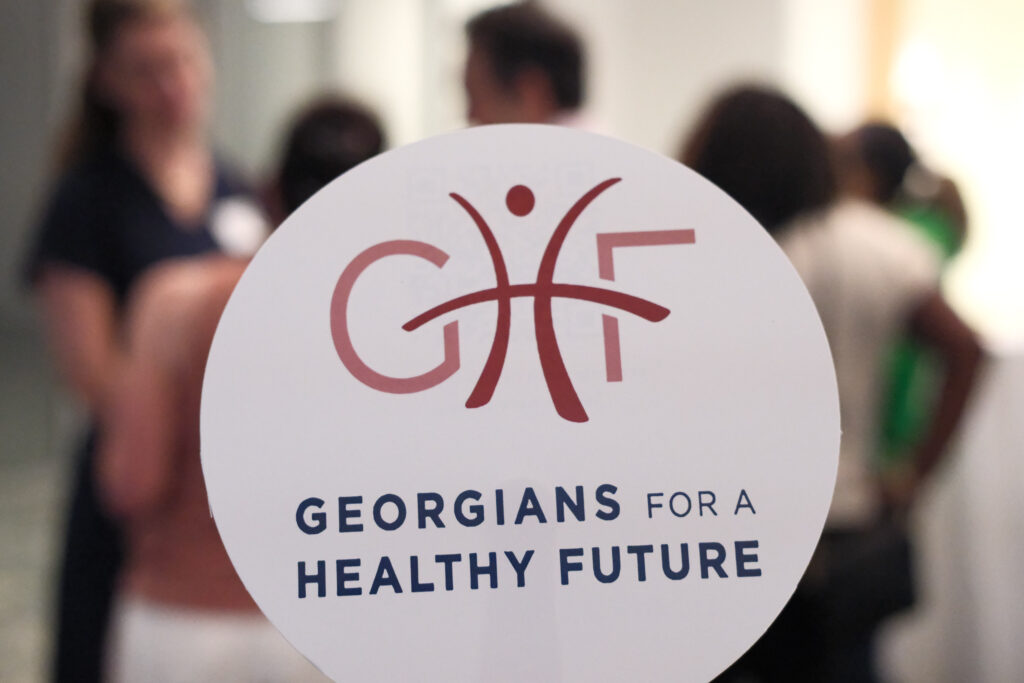An increasing number of factors are making it harder and more expensive for low-income Georgians to access and afford health care. Cuts made by the Trump administration, individuals losing insurance,…
Blog ()
- Home
- >
- GHF Blog
Category: GHF Blog

Georgia’s family caregivers give their time, energy, and hearts to care for loved ones every day. This National Family Caregivers Month, Georgians for a Healthy Future celebrates their stories and calls for stronger policies to support them.
November is National Family Caregivers Month, a time to honor the Georgians who care for loved ones, neighbors, and community members with strength and compassion. Every day, family caregivers perform acts of love in motion—managing medications, offering emotional support, navigating health systems, and keeping households running.
At Georgians for a Healthy Future (GHF), we’re proud to support caregivers through our Caregivers Advisory Group, which is dedicated to raising awareness and expanding outreach to caregivers of all ages, in both paid and unpaid roles. This group helps shape policies that ensure caregivers are recognized, supported, and connected to vital resources.
(more…)Shopping for health coverage? Here’s what to know for 2025

Open enrollment is almost here! From November 1, 2025, through January 15, 2026, Georgians can shop for health insurance coverage for 2026 through GeorgiaAccess.gov.
This year brings a few important changes, including higher premium rates and the end of extra savings that made coverage more affordable in recent years.
Here’s how to make the most of this year’s open enrollment period and find a plan that works for you and your family.
(more…)Autism and Vaccine Safety: Facts and Trusted Resources | GHF
You may have seen recent reports about the issues of vaccine safety and the causes of autism that were unfounded and not based on scientific evidence. These reports have caused understandable confusion among parents, families, and people with autism. In the face of so much misinformation, I wanted share a few facts, and highlight the trusted resources and experts that we turn to at GHF:
(more…)Progress takes time, but it’s driven by people who never stop pushing for it. At this year’s Celebration of Progress & Possibilities, we honor two changemakers whose lifelong dedication to health care and health policy has had a profoundly positive impact on the lives of Georgians: Andy Miller and Wendy Tiegreen.
(more…)Updated: Why ACA Premiums May Soon Become Less Affordable and What an Expiring Tax Credit Could Mean for Georgia Families

Update – August 2025: Enhanced Affordable Care Act premium tax credits (ePTCs) still expire on December 31, 2025, unless Congress acts. In 2025, Georgia Access enrolled over 1.5 million Georgians, 93% of whom depend on these subsidies to make health coverage affordable. Without an extension, premiums in Georgia are projected to jump over 75% on average, and most 2026 insurer filings already assume the credits will lapse. A typical example: a 60-year-old couple earning about $85,000 would pay roughly $18,000 more per year if the ePTCs disappear. The premium increases resulting from the expiration of the ePTCs could cause about 340,000 more Georgians to become uninsured. In short: swift Congressional action to extend the ePTCs—ideally before rate finalization—would prevent sharp premium spikes for Georgia families and avert significant coverage losses.
See how costs could rise in your Congressional district or use the calculator to estimate cost increases based on your income information — then contact your members of Congress today and tell them to extend the enhanced premium tax credits to keep health care affordable for Georgia families.
(more…)
Since 2008, Georgians for a Healthy Future has partnered with community members, organizations, and decision-makers to help make health care more affordable and accessible across the state.
In 2024, your support has helped us make meaningful progress:
Making Medicaid and Marketplace Coverage Work Better for Georgians
- We worked with Voices for Georgia’s Children to streamline children’s Medicaid enrollment through Express Lane Eligibility
- Our staff submitted detailed recommendations and helped mobilize public comments to improve the state’s Pathways to Coverage program
- GHF’s Executive Director spoke at Georgia’s first legislative hearing focused on Medicaid expansion, offering expert testimony to help lawmakers understand the coverage gap
Georgians with Medicaid or Georgia Access coverage: Your story matters.
Georgians for a Healthy Future is partnering with Families USA to amplify the voices of Georgians who rely on Medicaid and affordable health coverage. If you’ve been helped by Medicaid or the enhanced premium tax credits through Georgia Access, we invite you to share your story.
Why Your Story is Important
Right now, health care protections are at risk. With federal cuts to Medicaid on the horizon and the possible expiration of enhanced tax credits, it’s more important than ever for Georgians to speak up and make their voices heard. Your story can help policymakers understand how these programs affect real lives — and why they need to be protected.
(more…)Join GHF’s New Caregiver Coalition and Help Shape Better Policies
Georgians for a Healthy Future is launching a new Caregiver Coalition, and we want you to be part of it.
Why Join the Caregiver Coalition?
Family caregivers play a critical role in supporting the health and well-being of Georgians. Whether you care for an adult or child with an intellectual or developmental disability, a physical disability, an aging family member, or someone with complex health needs, your experiences matter.
(more…)Will Washington Roll Back Georgia’s Coverage Gains?
Background
On May 22, the U.S. House passed a sweeping budget bill, known as the “One Big Beautiful Bill” Act. The budget bill proposes significant changes to the Affordable Care Act (ACA) Health Insurance Marketplace, which is known as Georgia Access in our state. Proponents say these changes will cut costs, but they would also make it harder for many Georgians to enroll in or keep their health coverage.
The Senate is now making its changes to the bill, but what those changes will look like is unclear. As currently written, projections from the non-partisan Congressional Budget Office (CBO) show the House’s changes would reduce overall Marketplace enrollment and increase the uninsured rate nationally and in Georgia. If the budget bill passes as currently written, the combination of Marketplace (including allowing the expiration of the enhanced premium tax credits) and Medicaid changes could lead to an estimated 560,000-940,000 Georgians becoming uninsured.[1] (Notably, some of the marketplace changes presently in the bill are also under consideration by the Centers for Medicare & Medicaid Services (CMS), meaning they could be authorized through federal regulation even without new legislation.)
(more…)Will Washington Roll Back Georgia’s Coverage Gains?
Background
On May 22, the U.S. House passed a sweeping budget bill, known as the “One Big Beautiful Bill” Act. The budget bill proposes significant changes to the Affordable Care Act (ACA) Health Insurance Marketplace, which is known as Georgia Access in our state. Proponents say these changes will cut costs, but they would also make it harder for many Georgians to enroll in or keep their health coverage.
The Senate is now making its changes to the bill, but what those changes will look like is unclear. As currently written, projections from the non-partisan Congressional Budget Office (CBO) show the House’s changes would reduce overall Marketplace enrollment and increase the uninsured rate nationally and in Georgia. If the budget bill passes as currently written, the combination of Marketplace (including allowing the expiration of the enhanced premium tax credits) and Medicaid changes could lead to an estimated 560,000-940,000 Georgians becoming uninsured.[1] (Notably, some of the marketplace changes presently in the bill are also under consideration by the Centers for Medicare & Medicaid Services (CMS), meaning they could be authorized through federal regulation even without new legislation.)
(more…)Stay Connected
Archive
- November 2025
- October 2025
- September 2025
- August 2025
- July 2025
- June 2025
- May 2025
- April 2025
- March 2025
- February 2025
- January 2025
- October 2024
- May 2024
- April 2024
- March 2024
- February 2024
- January 2024
- December 2023
- October 2023
- July 2023
- April 2023
- March 2023
- February 2023
- January 2023
- December 2022
- October 2022
- September 2022
- August 2022
- June 2022
- April 2022
- March 2022
- February 2022
- January 2022
- December 2021
- November 2021
- October 2021
- September 2021
- August 2021
- June 2021
- May 2021
- April 2021
- March 2021
- February 2021
- January 2021
- December 2020
- November 2020
- October 2020
- September 2020
- July 2020
- June 2020
- May 2020
- April 2020
- March 2020
- February 2020
- January 2020
- December 2019
- November 2019
- October 2019
- September 2019
- August 2019
- July 2019
- May 2019
- April 2019
- March 2019
- February 2019
- January 2019
- December 2018
- November 2018
- October 2018
- September 2018
- August 2018
- July 2018
- June 2018
- May 2018
- April 2018
- March 2018
- February 2018
- January 2018
- December 2017
- November 2017
- October 2017
- September 2017
- August 2017
- July 2017
- June 2017
- May 2017
- April 2017
- March 2017
- February 2017
- January 2017
- December 2016
- November 2016
- October 2016
- September 2016
- August 2016
- July 2016
- June 2016
- May 2016
- April 2016
- March 2016
- February 2016
- January 2016
- December 2015
- November 2015
- October 2015
- September 2015
- August 2015
- July 2015
- June 2015
- May 2015
- April 2015
- March 2015
- February 2015
- January 2015
- December 2014
- November 2014
- October 2014
- September 2014
- July 2014
- May 2014
- March 2014
- January 2014
- December 2013
- October 2013
- September 2013
- August 2013
- July 2013
- June 2013
- May 2013
- April 2013
- March 2013
- February 2013
- January 2013
- November 2012
- October 2012
- September 2012
- July 2012
- June 2012
- May 2012
- April 2012
- March 2012
- February 2012
- January 2012
- December 2011
- November 2011
- October 2011
- September 2011
- August 2011
- July 2011
- June 2011
- April 2011
- March 2011
- February 2011
- January 2011
- December 2010
- November 2010
- October 2010
- September 2010
- August 2010
- July 2010
- June 2010
- May 2010
- April 2010
- March 2010
- February 2010
- January 2010
- December 2009
- November 2009
- October 2009



